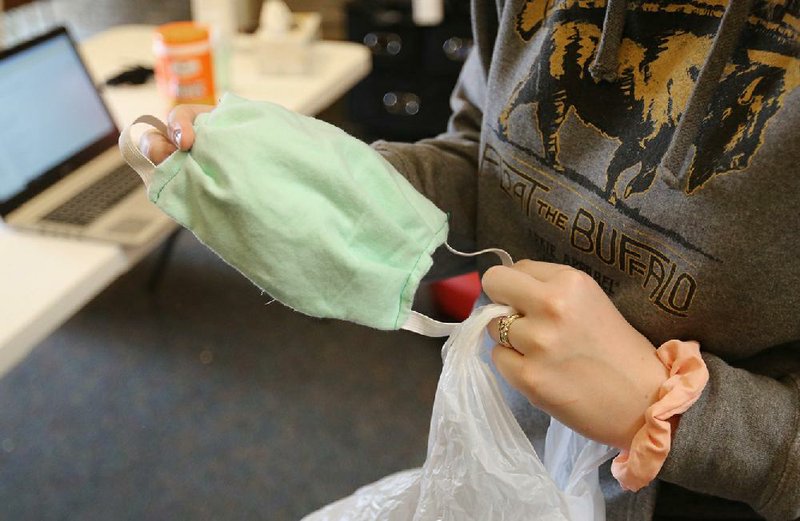Heaps of fabric scraps, discarded from shows past, are abruptly finding themselves thrust into a fresh role at the Arkansas Repertory Theatre: homemade face masks to shield against the spread of covid-19.
About four regular costumers are sewing the cloth into masks in the theater's workshop, which has enough space for them to stay more than 6 feet apart, said Becky Heldt, director of marketing for the theater. The costumers, who don't have costuming work to do because the theater has canceled its upcoming plays, are among several groups across the state making masks as Arkansas' supply of protective equipment for health care workers dwindles and the number of covid-19 cases multiplies.
"They've been using this down time to do what they can, which is what they know how to do," Heldt said. The masks are set to be donated to local hospitals.
Gov. Asa Hutchinson, during his Tuesday press briefing, said the state had just received 24 pallets of personal protective equipment and purchased more N95 masks. He added that the state would continue purchasing equipment.
[CORONAVIRUS: Click here for our complete coverage » arkansasonline.com/coronavirus]
While health experts say the cloth masks can't do the job of surgical masks or N95 masks, the homemade versions can be used in certain circumstances to preserve the use of traditional masks for health care professionals treating covid-19 patients.
"[Cloth masks] will not prevent someone from acquiring the covid-19 infection," said Dr. Jennifer Dillaha, the Arkansas Department of Health's medical director for immunizations. "But if you are using a mask to prevent yourself from spreading the disease by coughing or sneezing because the disease is spread by droplets, and if they're wearing a mask when they cough or sneeze, it prevents the spread of those droplets."
Those with sewing skills across the world -- places like Belgium, Spain, Seattle and South Carolina -- are rallying around the cause, the Associated Press reported.
The U.S. Centers for Disease Control and Prevention has published a set of recommendations for using personal protective equipment as long as possible, which include using a bandana or scarf as a last resort.
At the University of Arkansas for Medical Sciences, officials are working on creating a pattern that the hospital can use, although they were not accepting donations as of Tuesday afternoon, said spokeswoman Leslie Taylor.
The Saline County Memorial Hospital is accepting homemade masks. Their "usage will be determined as they are collected and depending on need at the time," said Katie Lea, chief nursing officer, in an email through a spokeswoman.
Arkansas Children's Hospital is not accepting homemade masks, spokeswoman Hillary DeMillo said via email.
At Baptist Health in Little Rock, the hospital is using the cloth masks only on top of other protective equipment for "patients in limited low risk areas," said Dr. Eddie Phillips, Baptist's chief medical officer, in an email through a spokeswoman.
Using homemade masks on top of other equipment could extend the life of N-95 masks if it keeps them from getting wet, Dillaha said.
Kris Boulton, the Saline County extension agent and staff chair, saw that people in her county were itching to help, so she started researching and calling local clinics to see what they needed.
She's posted a video explaining some of the best practices on her agency's Facebook page, UAEX Saline County Family & Consumer Sciences.
"We know handmade is not anything like medical grade, but there is a place for them if all the supplies are depleted," Boulton said, adding, "With people housebound and very scared, this is something -- they have fabric at home, they can do this."
In Springdale, the Arkansas Arts and Fabric Forum has created patterns and is providing people with fabric. They've also built a web page to answer frequently asked questions about how to make masks, said Robin Wallis Atkinson, the forum's chief executive officer.
The page -- arkansasfashion.org/masks -- is in part to divert the stream of questions local hospitals are fielding during a time they need to be focusing on dealing with a pandemic, Wallis Atkinson added.
"Part of the service that we're trying to offer is being the point of contact for people," she said.
The Repertory Theatre is also serving as a drop-off location for Arkansas residents who make their own masks. Those interested in scheduling a drop-off can email hdavis@therep.org, Heldt said.
Others are looking toward more technical solutions for the emerging shortage.
Dr. David Rainosek, a internist with Cornerstone Specialty Hospitals in Little Rock, this week built a prototype for a device using common household items -- including a microwave -- to sterilize personal protective equipment.
"There is no situation where, under normal circumstances, we would ever reuse any of [this] personal protective equipment ... it's all one-time-use disposable, and it's meant as a safety precaution," said Rainosek, who is a former biomedical engineer.
"But in the current circumstance, it's not possible. We simply don't have enough."
The protocol he worked on incorporates a 2,250-watt microwave, a Pyrex dish, plastic Jell-O shot containers and other readily available items.
It's based on research published after the 2003 SARS outbreak that suggested a combination of moderate microwave radiation and steam could sterilize N95 masks without breaking down their integrity, he said.
He has shared his instructions with a few states that expressed interest in trying out the method, though he cautions it isn't expected to be pushed through for regulatory approval.
"It is really just meant as an emergency stopgap," he said.
Metro on 03/25/2020
